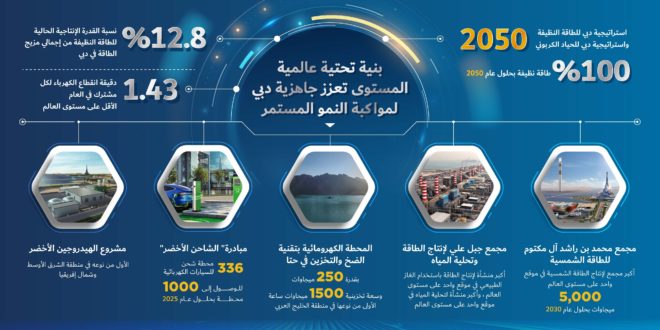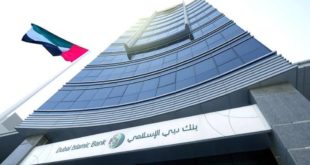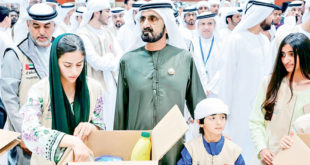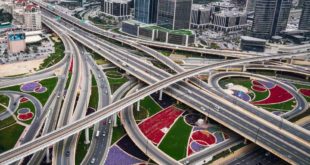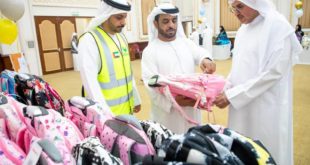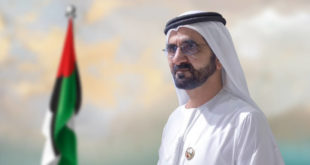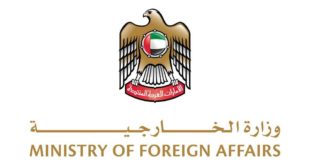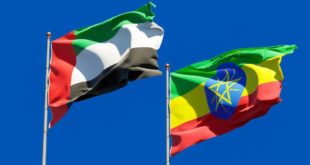Developed world class infrastructure.
Giant projects led by DEWA to establish a global infrastructure that supports the transition to green energy.
Saeed Mohammed Al Tayer:
We are working to diversify energy sources with pioneering projects for various clean and renewable energy sources and technologies within the framework of the Dubai Clean Energy Strategy 2050 and the Dubai Carbon Neutrality Strategy 2050.
We aim to provide 100% of the energy production capacity in Dubai from clean energy sources by 2050.
The percentage of clean energy production capacity is about 12.8% of the total energy mix in Dubai, and it is expected to reach about 14% by the end of this year.
The emirate seeks to be a global center for clean energy and sustainability.
Dubai aims to eliminate nearly 8 million tons of carbon emissions, and achieve financial savings of 3 billion dirhams over the next three decades.
………………………….
Dubai on December 14th
The ambitious strategy of the Emirate of Dubai to transition to a green economy has gained significant momentum, with the emirate’s recent adoption of a road map that aims to make public transportation carbon-free by 2050, with initiatives ranging from investing in advanced infrastructure, strengthening the foundations of a circular economy, and expanding the scope of green mobility, in an effort to eliminate nearly 8 million tons of carbon dioxide emissions, equivalent to planting 132 million trees, and achieving financial savings of 3 billion dirhams over the next three decades.
The roadmap is part of a series of initiatives that spearhead the emirate’s clean energy strategy and zero carbon emission strategy, which seeks to transform Dubai into a city with the lowest carbon footprint in the world and a global center for clean energy.
Dubai’s advanced infrastructure, which it established over decades and continues to develop and modernize according to the best international standards, has enabled it to pursue this great ambition that is in line with global trends and UAE pledges on environmental issues, in parallel with Dubai’s endeavor to confirm its position as the best city in the world to live and work. Visiting and consolidating its position as a global center for economy and trade, promoting the comprehensive and sustainable development process, encouraging foreign investments and achieving the happiness of citizens, residents and visitors.
There is no doubt that these achievements and successes achieved by Dubai are supported by a strong world-class infrastructure owned by the Dubai Electricity and Water Authority, to form a fundamental pillar in the renaissance and prosperity of the emirate thanks to the directives and vision of His Highness Sheikh Mohammed bin Rashid Al Maktoum, Vice President and Prime Minister of the UAE and Ruler of Dubai, “may God protect him.” “.
As part of its efforts to contribute to the prosperity of Dubai’s economy, DEWA has become a global model for energy efficiency and reliability, the provision of its services in accordance with the highest standards, reliability, efficiency and quality, and keeping pace with the increase in demand for energy and water by raising the production capacity, which currently reaches 14,317 megawatts of electricity and 490 million gallons of desalinated water per day, in addition to raising the capacity of the transmission and distribution networks in line with the significant expansion witnessed by Dubai, as the authority provides electricity and water services to about 3.5 million residents of Dubai, and more than 4.7 million people during the day.
During Expo 2020 Dubai, which lasted for six months and hosted more than 24 million people from different countries of the world, the authority continued its efforts to provide the best services, achieving a new world record in the average power outage per subscriber, as Dubai recorded an average of 1.43 minutes outage per subscriber per year during 2021. , compared to 15 minutes for selected electricity companies in the European Union.
The authority’s results are superior to the elite service institutions in Europe and the United States in various indicators of global competitiveness, and it has achieved many successes and achievements that have placed it in the ranks of the most distinguished institutions and one of the most innovative service institutions in the world.
Regarding the role of DEWA in providing an advanced infrastructure for electricity and water in the Emirate of Dubai, His Excellency Saeed Mohammed Al Tayer, Managing Director and CEO of DEWA, said: “In line with the vision of the wise leadership to increase the proportion of renewable and clean energy within the energy mix in Dubai, we are working to diversify the sources of Energy in Dubai through pioneering projects that include various sources and technologies of clean and renewable energy available in Dubai within the framework of the Dubai Clean Energy Strategy 2050 and the Dubai Carbon Neutrality Strategy 2050, which aims to provide 100% of the energy production capacity in Dubai from clean energy sources by 2050, The percentage of clean energy production capacity is about 12.8% of the total energy mix in Dubai, and it is expected to reach about 14% by the end of this year.
Dubai is one of the leading cities in the development of the renewable and clean energy sector, and the first in devising modern methods and methods to enhance the efficiency of the energy sector, rationalize the consumption of natural resources, and find alternative solutions to traditional energy in order to support sustainable development in the emirate.
Among the pioneering projects implemented by the Authority in the field of clean energy is the Mohammed bin Rashid Al Maktoum Solar Park, the largest solar energy production complex in one location in the world, according to the independent producer system, and its production capacity will reach 5,000 megawatts by 2030. The complex reduces more than 6.5 million tons of carbon emissions annually.
The complex includes a research and development center and an innovation center that constitutes a global incubator for innovation in the energy and water sectors, and a major landmark of Dubai that provides a pioneering experience for visitors to learn about the latest innovations in various fields of clean and renewable energy.
The Jebel Ali complex for energy production and water desalination of the Authority is one of the main pillars for providing the Emirate of Dubai with reliable electricity and water services.
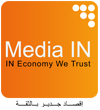 Media ININ Economy We Trust
Media ININ Economy We Trust

